The session was co-chaired by the coordinator of the “Jigisemejiri” program, the Regional Director of Social Development and Solidarity Economy of Ségou (DRDSES), the National Director of Social Protection and Solidarity Economy (DNPSES).
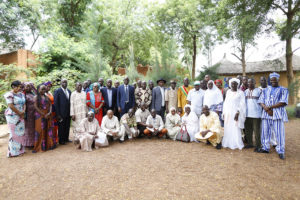 The objective of this 18th session was to review the activities of completion of initial funding and to identify the level of implementation of new funding as well as various ongoing collaborations. It marks the end of the first funding and the start of new funding for the second phase of the program.
The objective of this 18th session was to review the activities of completion of initial funding and to identify the level of implementation of new funding as well as various ongoing collaborations. It marks the end of the first funding and the start of new funding for the second phase of the program.
The CTN is the technical body for the design, management, and supervision of the JIGISEMEJIRI Social Nets Program.
At the opening ceremony of the session, the representative of the governor of the region of Segou in his speech, welcomed the regularity in the quarterly organization of the sessions of the CTN program. He also said that the program will be very soon in the circle of Macina and Segou in addition to the circles of Bla, Tominian and Baraoueli.
The coordinator of Jigisemejiri recalled that this session was an opportunity to take stock of the activities: “in particular the work carried out by the program by component. To see the state of implementation of the various financing planned for the period 2019 – 2022. And then to take stock of certain aspects of collaboration that we have with the various partners, which are WFP, FAO, the World Bank and those who have followed the program financially over the four-year period. “
The National Agency for Medical Assistance (ANAM) represented by Dr. Hassane TANGARA explained the collaboration between jigisemejiri and ANAM in these terms: “We have a contribution in the implementation of the program. It’s true, Jigisemejiri is a program against poverty, and we intervene in the framework of social protection. We offer care to jigisemejiri beneficiaries, who are registered in the jigisemejiri file. And we use this file to be able to register at the level of our structure. “
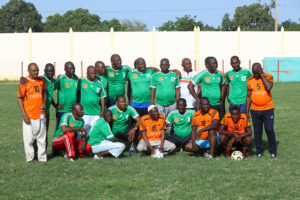 It should be noted that the results expected at the end of the 18th session of the TNC have been achieved overall, in particular the minutes of the 17th session of the TNC have been validated; the situation of financing closure activities (FA1) was presented and solutions were provided for the major bottlenecks encountered; the 2019-2023 perspectives of the program were shared; preparations for the annual meeting of COP 2020 were shared; and finally the actors were informed about the NEXUS processes, the Social Protection Floor, the Adaptive Social Protection and the RSU.
It should be noted that the results expected at the end of the 18th session of the TNC have been achieved overall, in particular the minutes of the 17th session of the TNC have been validated; the situation of financing closure activities (FA1) was presented and solutions were provided for the major bottlenecks encountered; the 2019-2023 perspectives of the program were shared; preparations for the annual meeting of COP 2020 were shared; and finally the actors were informed about the NEXUS processes, the Social Protection Floor, the Adaptive Social Protection and the RSU.
The session was marked by a football match between TNC and the CCR.
Source: Jigisemejiri


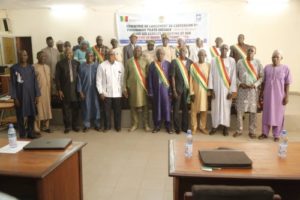 The purpose of these regional launching ceremonies was to inform and sensitize regional and local officials on the objectives, components and implementation conditions of the “jigisemejiri” program and to initiate the process of ownership.
The purpose of these regional launching ceremonies was to inform and sensitize regional and local officials on the objectives, components and implementation conditions of the “jigisemejiri” program and to initiate the process of ownership.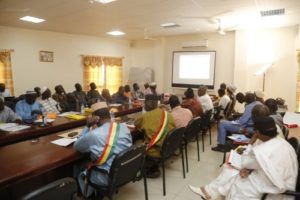 The mayor of the rural commune of Femayé in the circle of Djenné, Moussa Gouro Diall expressed his satisfaction: “We thank jigisemejiri, its technical and financial partners. We welcome the news as a breath of fresh air in the circle of Djenné and obviously all the municipalities that are concerned because it will support for 36 months our vulnerable populations. For us, this social safety net is extremely important for our people. ”
The mayor of the rural commune of Femayé in the circle of Djenné, Moussa Gouro Diall expressed his satisfaction: “We thank jigisemejiri, its technical and financial partners. We welcome the news as a breath of fresh air in the circle of Djenné and obviously all the municipalities that are concerned because it will support for 36 months our vulnerable populations. For us, this social safety net is extremely important for our people. ”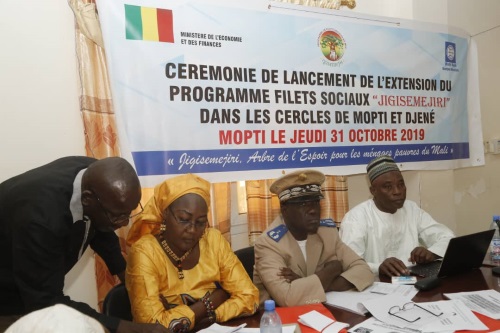 It should be remembered that the regions of Ségou and Mopti have 5,000 new beneficiaries each out of the 25,000 beneficiaries added to the program. This will enable the program to exceed 100,000 cash-receiving households in Mali by the four-year horizon.
It should be remembered that the regions of Ségou and Mopti have 5,000 new beneficiaries each out of the 25,000 beneficiaries added to the program. This will enable the program to exceed 100,000 cash-receiving households in Mali by the four-year horizon.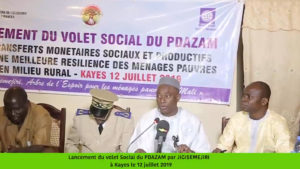 The Mali Arid Zone Agricultural Productivity and Diversification Project (PDAZAM) was officially launched on 12 July 2019 in the Kayes region. Here, the program will cover 2,630 households in Diéma, Nioro and Yélimané circles in social cash transfers of 15,000 FCFA per month and 1960 households in productive cash transfer of 250,000 FCFA.
The Mali Arid Zone Agricultural Productivity and Diversification Project (PDAZAM) was officially launched on 12 July 2019 in the Kayes region. Here, the program will cover 2,630 households in Diéma, Nioro and Yélimané circles in social cash transfers of 15,000 FCFA per month and 1960 households in productive cash transfer of 250,000 FCFA.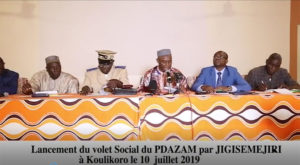 Funded at more than 34 billion CFA francs, the project for the development of agricultural productivity and diversification of the semi-arid zones of Mali (PDAZAM) was launched last Wednesday in Koulikoro, in the presence of the cabinet director of the governor Sékou Samaké and the project coordinator Mahmoud Ali Sako. The ceremony was an opportunity to inform and sensitize regional and local officials on the objectives, components and conditions of implementation of PDAZAM in the regions of Kayes and Koulikoro and to initiate the process of ownership by those responsible. regional and local
Funded at more than 34 billion CFA francs, the project for the development of agricultural productivity and diversification of the semi-arid zones of Mali (PDAZAM) was launched last Wednesday in Koulikoro, in the presence of the cabinet director of the governor Sékou Samaké and the project coordinator Mahmoud Ali Sako. The ceremony was an opportunity to inform and sensitize regional and local officials on the objectives, components and conditions of implementation of PDAZAM in the regions of Kayes and Koulikoro and to initiate the process of ownership by those responsible. regional and local